Nursing Assignment: HPCA Act (2003) & NCNZ Code of Conduct Analysis
VerifiedAdded on 2021/04/21
|6
|1096
|133
Report
AI Summary
This nursing assignment analyzes the Health Practitioners Competence Assurance (HPCA) Act (2003) and the Nursing Council of New Zealand's (NCNZ) Code of Conduct. The paper discusses the roles of these regulations in shaping contemporary nursing practice in New Zealand, emphasizing their impact on patient care and professional development. It highlights the HPCA Act's legislative framework for regulating healthcare professionals and the NCNZ's Code of Conduct, which sets standards for nurses. The discussion covers the core values and principles of the nursing code of conduct, such as trust, respect, integrity, and partnership, and explores the importance of ethical duties in nursing practice, referencing Florence Nightingale's contributions. Furthermore, the assignment touches upon the Ministry of Health's initiatives, like the tobacco control program, and its impact on public health.
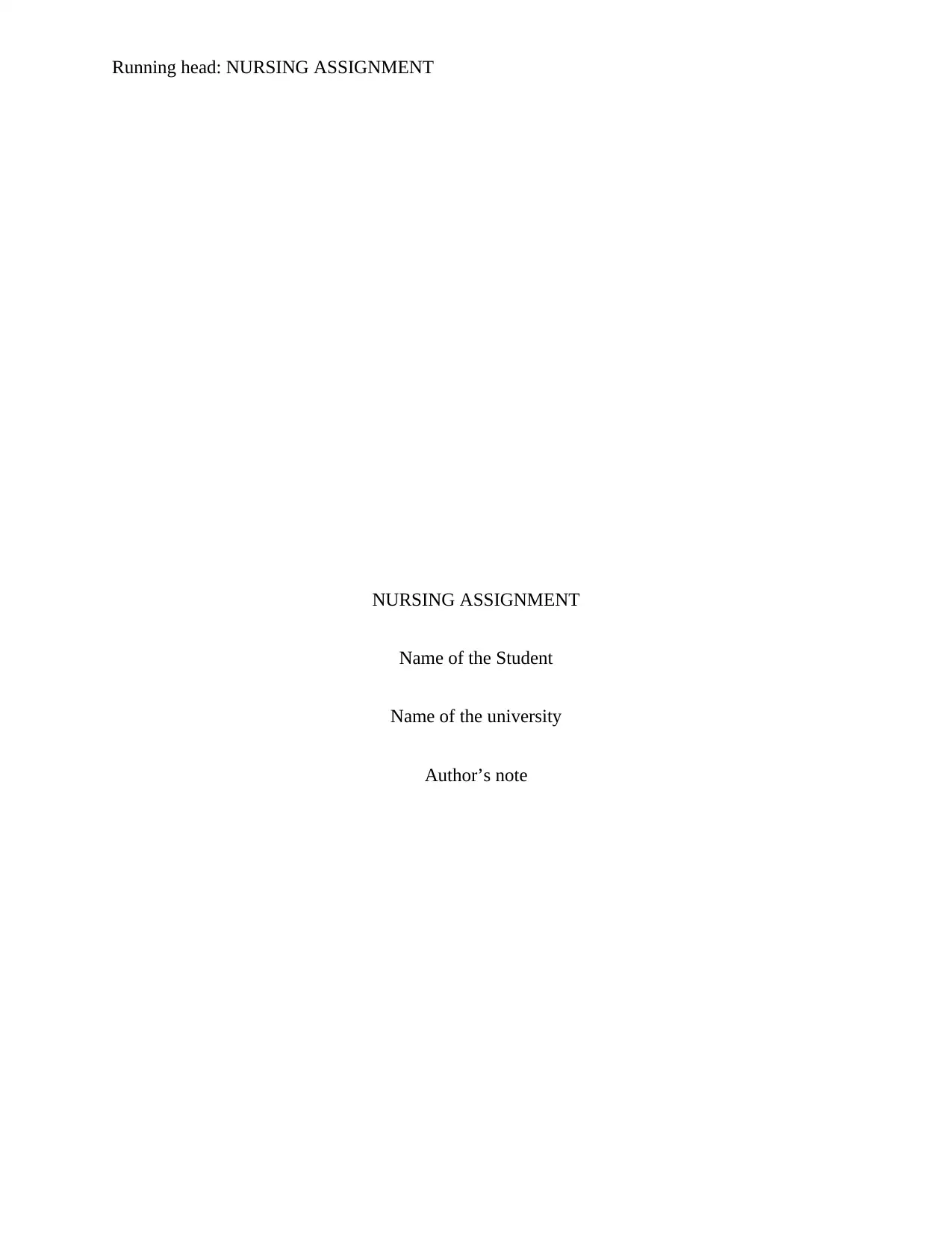
Running head: NURSING ASSIGNMENT
NURSING ASSIGNMENT
Name of the Student
Name of the university
Author’s note
NURSING ASSIGNMENT
Name of the Student
Name of the university
Author’s note
Paraphrase This Document
Need a fresh take? Get an instant paraphrase of this document with our AI Paraphraser
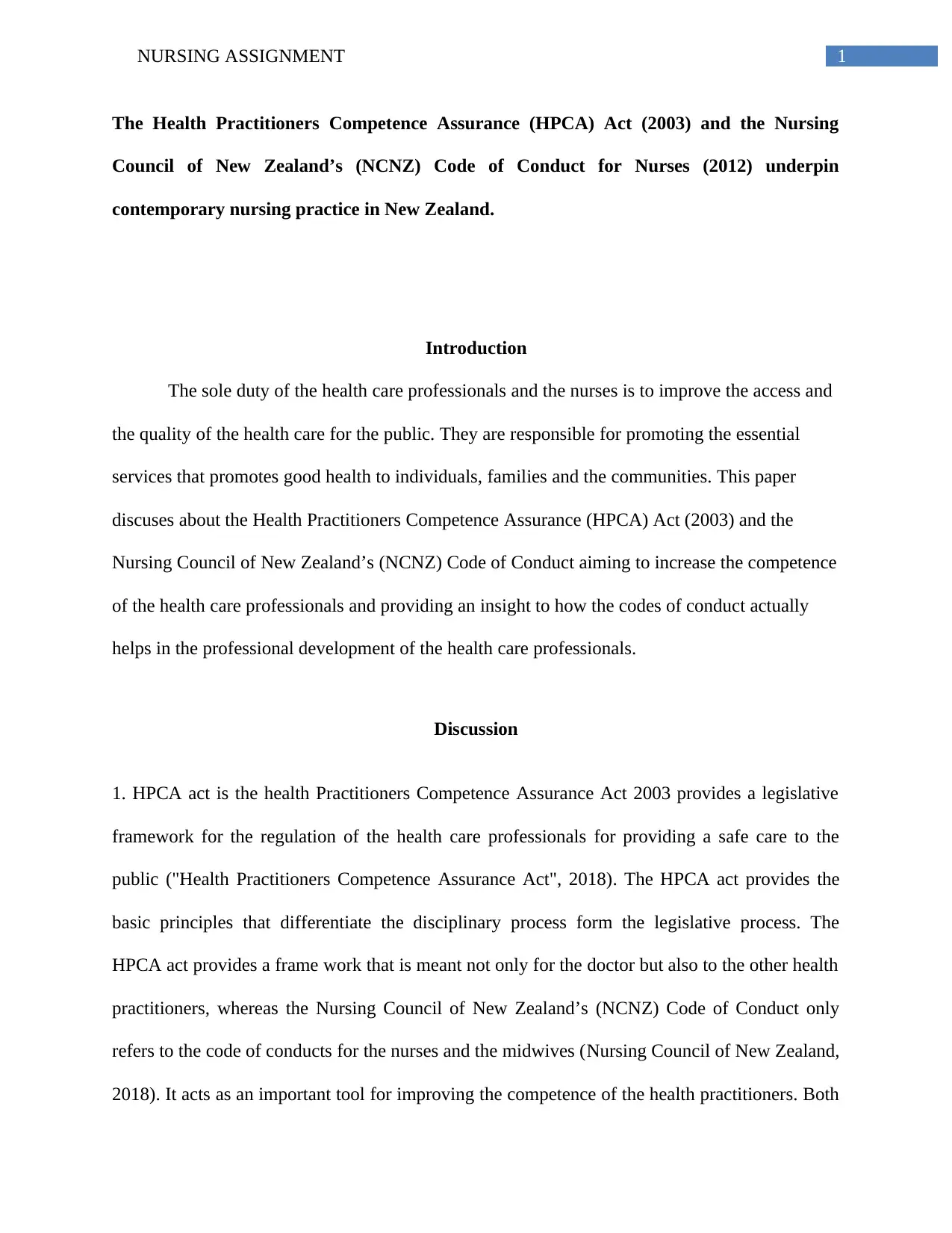
1NURSING ASSIGNMENT
The Health Practitioners Competence Assurance (HPCA) Act (2003) and the Nursing
Council of New Zealand’s (NCNZ) Code of Conduct for Nurses (2012) underpin
contemporary nursing practice in New Zealand.
Introduction
The sole duty of the health care professionals and the nurses is to improve the access and
the quality of the health care for the public. They are responsible for promoting the essential
services that promotes good health to individuals, families and the communities. This paper
discuses about the Health Practitioners Competence Assurance (HPCA) Act (2003) and the
Nursing Council of New Zealand’s (NCNZ) Code of Conduct aiming to increase the competence
of the health care professionals and providing an insight to how the codes of conduct actually
helps in the professional development of the health care professionals.
Discussion
1. HPCA act is the health Practitioners Competence Assurance Act 2003 provides a legislative
framework for the regulation of the health care professionals for providing a safe care to the
public ("Health Practitioners Competence Assurance Act", 2018). The HPCA act provides the
basic principles that differentiate the disciplinary process form the legislative process. The
HPCA act provides a frame work that is meant not only for the doctor but also to the other health
practitioners, whereas the Nursing Council of New Zealand’s (NCNZ) Code of Conduct only
refers to the code of conducts for the nurses and the midwives (Nursing Council of New Zealand,
2018). It acts as an important tool for improving the competence of the health practitioners. Both
The Health Practitioners Competence Assurance (HPCA) Act (2003) and the Nursing
Council of New Zealand’s (NCNZ) Code of Conduct for Nurses (2012) underpin
contemporary nursing practice in New Zealand.
Introduction
The sole duty of the health care professionals and the nurses is to improve the access and
the quality of the health care for the public. They are responsible for promoting the essential
services that promotes good health to individuals, families and the communities. This paper
discuses about the Health Practitioners Competence Assurance (HPCA) Act (2003) and the
Nursing Council of New Zealand’s (NCNZ) Code of Conduct aiming to increase the competence
of the health care professionals and providing an insight to how the codes of conduct actually
helps in the professional development of the health care professionals.
Discussion
1. HPCA act is the health Practitioners Competence Assurance Act 2003 provides a legislative
framework for the regulation of the health care professionals for providing a safe care to the
public ("Health Practitioners Competence Assurance Act", 2018). The HPCA act provides the
basic principles that differentiate the disciplinary process form the legislative process. The
HPCA act provides a frame work that is meant not only for the doctor but also to the other health
practitioners, whereas the Nursing Council of New Zealand’s (NCNZ) Code of Conduct only
refers to the code of conducts for the nurses and the midwives (Nursing Council of New Zealand,
2018). It acts as an important tool for improving the competence of the health practitioners. Both
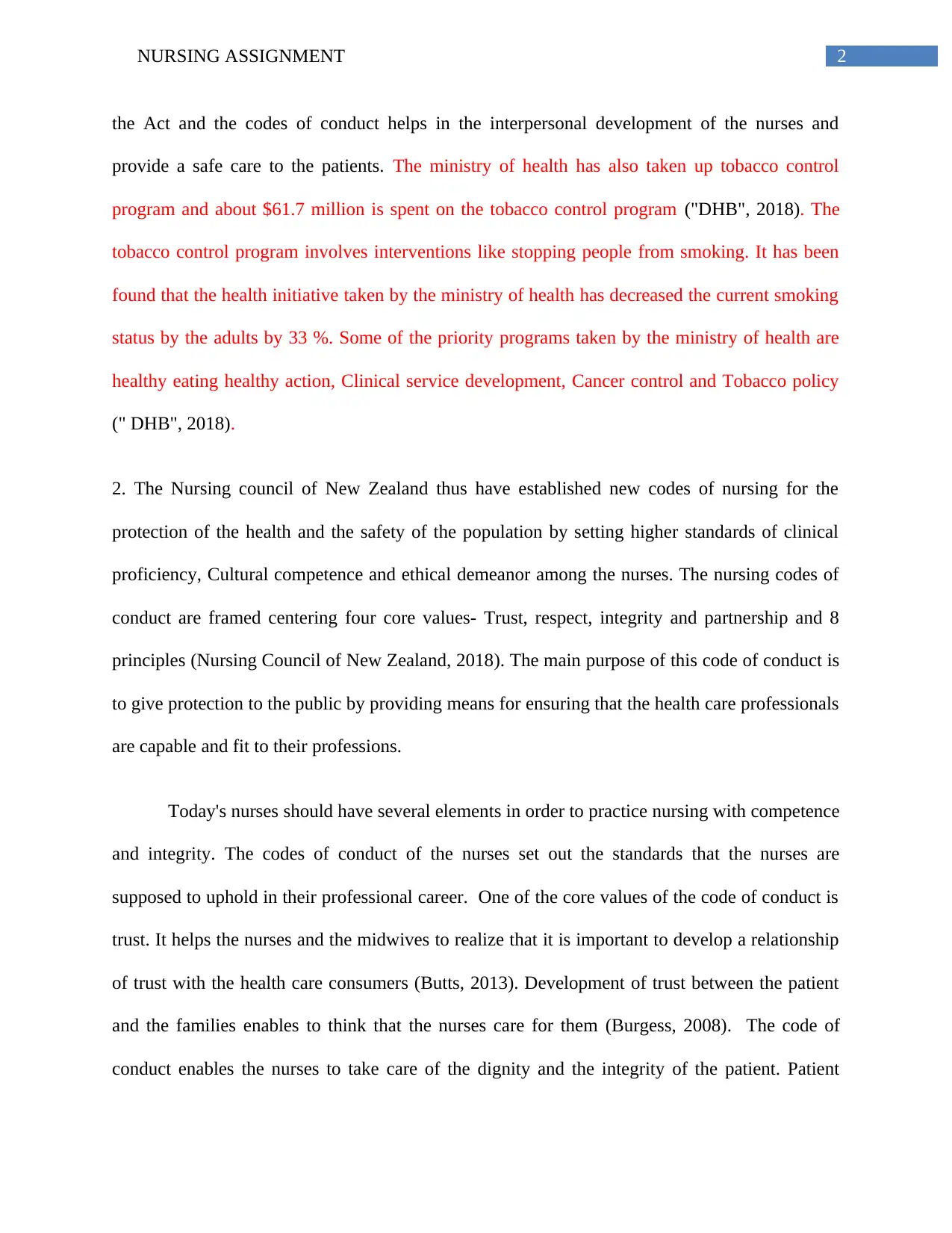
2NURSING ASSIGNMENT
the Act and the codes of conduct helps in the interpersonal development of the nurses and
provide a safe care to the patients. The ministry of health has also taken up tobacco control
program and about $61.7 million is spent on the tobacco control program ("DHB", 2018). The
tobacco control program involves interventions like stopping people from smoking. It has been
found that the health initiative taken by the ministry of health has decreased the current smoking
status by the adults by 33 %. Some of the priority programs taken by the ministry of health are
healthy eating healthy action, Clinical service development, Cancer control and Tobacco policy
(" DHB", 2018).
2. The Nursing council of New Zealand thus have established new codes of nursing for the
protection of the health and the safety of the population by setting higher standards of clinical
proficiency, Cultural competence and ethical demeanor among the nurses. The nursing codes of
conduct are framed centering four core values- Trust, respect, integrity and partnership and 8
principles (Nursing Council of New Zealand, 2018). The main purpose of this code of conduct is
to give protection to the public by providing means for ensuring that the health care professionals
are capable and fit to their professions.
Today's nurses should have several elements in order to practice nursing with competence
and integrity. The codes of conduct of the nurses set out the standards that the nurses are
supposed to uphold in their professional career. One of the core values of the code of conduct is
trust. It helps the nurses and the midwives to realize that it is important to develop a relationship
of trust with the health care consumers (Butts, 2013). Development of trust between the patient
and the families enables to think that the nurses care for them (Burgess, 2008). The code of
conduct enables the nurses to take care of the dignity and the integrity of the patient. Patient
the Act and the codes of conduct helps in the interpersonal development of the nurses and
provide a safe care to the patients. The ministry of health has also taken up tobacco control
program and about $61.7 million is spent on the tobacco control program ("DHB", 2018). The
tobacco control program involves interventions like stopping people from smoking. It has been
found that the health initiative taken by the ministry of health has decreased the current smoking
status by the adults by 33 %. Some of the priority programs taken by the ministry of health are
healthy eating healthy action, Clinical service development, Cancer control and Tobacco policy
(" DHB", 2018).
2. The Nursing council of New Zealand thus have established new codes of nursing for the
protection of the health and the safety of the population by setting higher standards of clinical
proficiency, Cultural competence and ethical demeanor among the nurses. The nursing codes of
conduct are framed centering four core values- Trust, respect, integrity and partnership and 8
principles (Nursing Council of New Zealand, 2018). The main purpose of this code of conduct is
to give protection to the public by providing means for ensuring that the health care professionals
are capable and fit to their professions.
Today's nurses should have several elements in order to practice nursing with competence
and integrity. The codes of conduct of the nurses set out the standards that the nurses are
supposed to uphold in their professional career. One of the core values of the code of conduct is
trust. It helps the nurses and the midwives to realize that it is important to develop a relationship
of trust with the health care consumers (Butts, 2013). Development of trust between the patient
and the families enables to think that the nurses care for them (Burgess, 2008). The code of
conduct enables the nurses to take care of the dignity and the integrity of the patient. Patient
⊘ This is a preview!⊘
Do you want full access?
Subscribe today to unlock all pages.

Trusted by 1+ million students worldwide
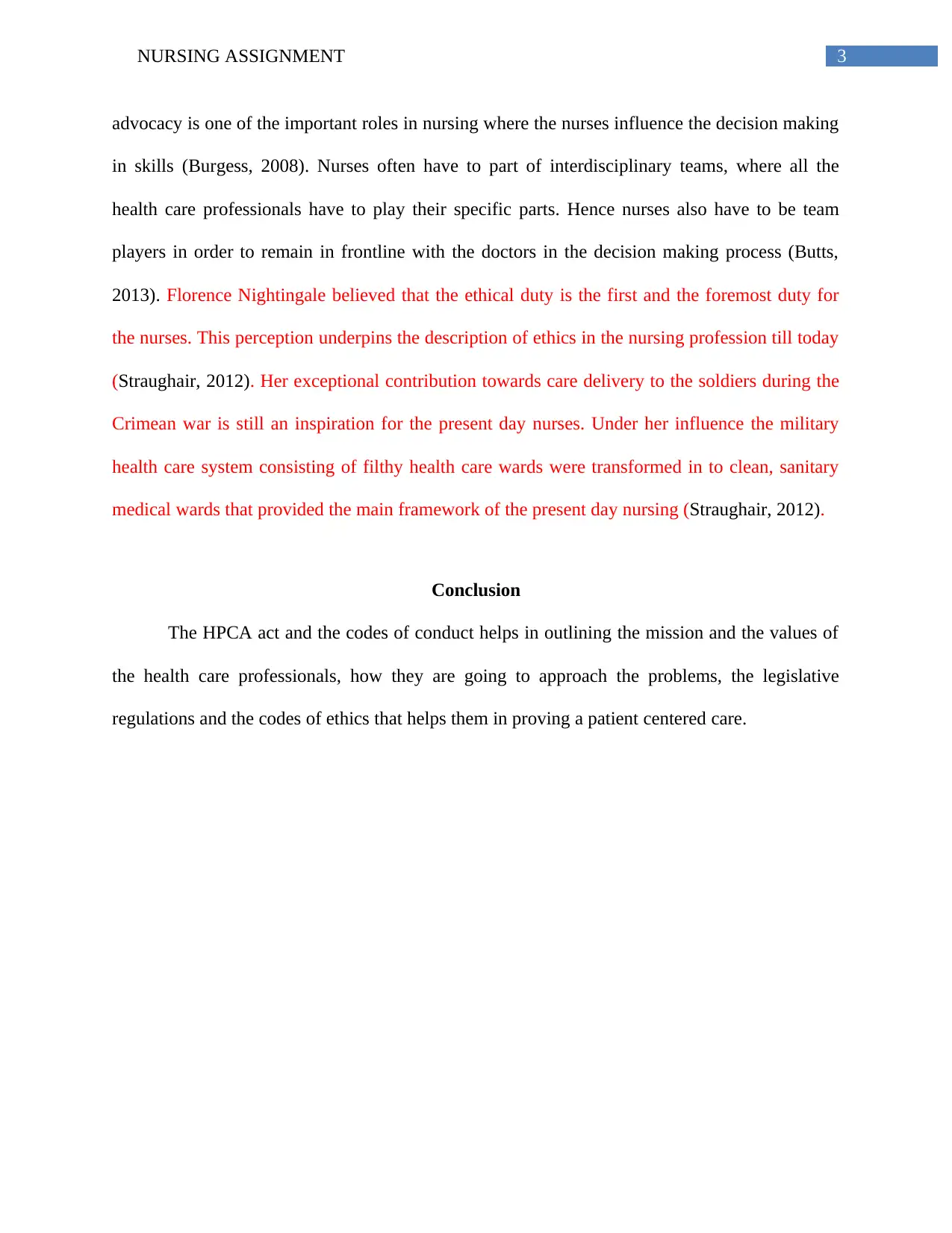
3NURSING ASSIGNMENT
advocacy is one of the important roles in nursing where the nurses influence the decision making
in skills (Burgess, 2008). Nurses often have to part of interdisciplinary teams, where all the
health care professionals have to play their specific parts. Hence nurses also have to be team
players in order to remain in frontline with the doctors in the decision making process (Butts,
2013). Florence Nightingale believed that the ethical duty is the first and the foremost duty for
the nurses. This perception underpins the description of ethics in the nursing profession till today
(Straughair, 2012). Her exceptional contribution towards care delivery to the soldiers during the
Crimean war is still an inspiration for the present day nurses. Under her influence the military
health care system consisting of filthy health care wards were transformed in to clean, sanitary
medical wards that provided the main framework of the present day nursing (Straughair, 2012).
Conclusion
The HPCA act and the codes of conduct helps in outlining the mission and the values of
the health care professionals, how they are going to approach the problems, the legislative
regulations and the codes of ethics that helps them in proving a patient centered care.
advocacy is one of the important roles in nursing where the nurses influence the decision making
in skills (Burgess, 2008). Nurses often have to part of interdisciplinary teams, where all the
health care professionals have to play their specific parts. Hence nurses also have to be team
players in order to remain in frontline with the doctors in the decision making process (Butts,
2013). Florence Nightingale believed that the ethical duty is the first and the foremost duty for
the nurses. This perception underpins the description of ethics in the nursing profession till today
(Straughair, 2012). Her exceptional contribution towards care delivery to the soldiers during the
Crimean war is still an inspiration for the present day nurses. Under her influence the military
health care system consisting of filthy health care wards were transformed in to clean, sanitary
medical wards that provided the main framework of the present day nursing (Straughair, 2012).
Conclusion
The HPCA act and the codes of conduct helps in outlining the mission and the values of
the health care professionals, how they are going to approach the problems, the legislative
regulations and the codes of ethics that helps them in proving a patient centered care.
Paraphrase This Document
Need a fresh take? Get an instant paraphrase of this document with our AI Paraphraser
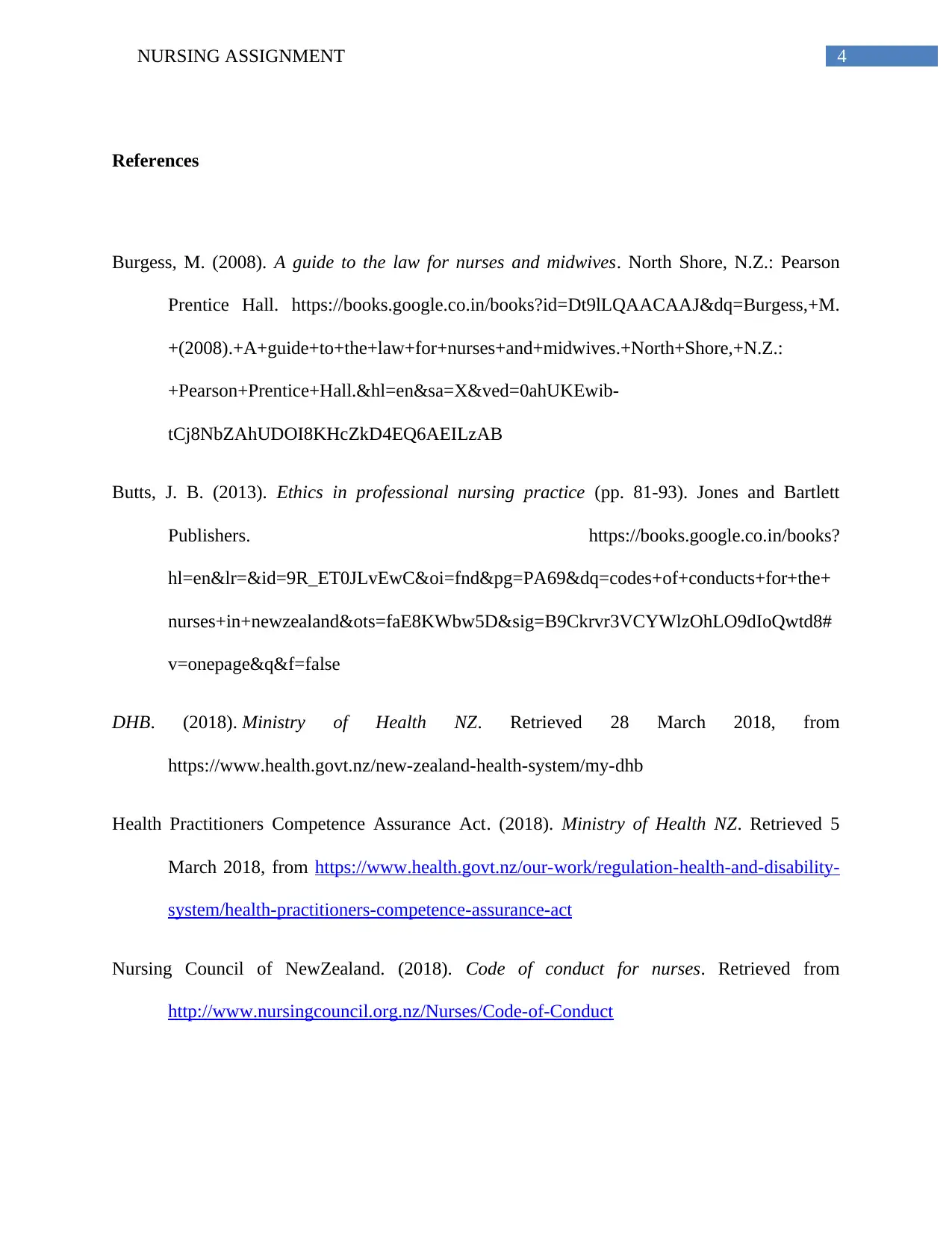
4NURSING ASSIGNMENT
References
Burgess, M. (2008). A guide to the law for nurses and midwives. North Shore, N.Z.: Pearson
Prentice Hall. https://books.google.co.in/books?id=Dt9lLQAACAAJ&dq=Burgess,+M.
+(2008).+A+guide+to+the+law+for+nurses+and+midwives.+North+Shore,+N.Z.:
+Pearson+Prentice+Hall.&hl=en&sa=X&ved=0ahUKEwib-
tCj8NbZAhUDOI8KHcZkD4EQ6AEILzAB
Butts, J. B. (2013). Ethics in professional nursing practice (pp. 81-93). Jones and Bartlett
Publishers. https://books.google.co.in/books?
hl=en&lr=&id=9R_ET0JLvEwC&oi=fnd&pg=PA69&dq=codes+of+conducts+for+the+
nurses+in+newzealand&ots=faE8KWbw5D&sig=B9Ckrvr3VCYWlzOhLO9dIoQwtd8#
v=onepage&q&f=false
DHB. (2018). Ministry of Health NZ. Retrieved 28 March 2018, from
https://www.health.govt.nz/new-zealand-health-system/my-dhb
Health Practitioners Competence Assurance Act. (2018). Ministry of Health NZ. Retrieved 5
March 2018, from https://www.health.govt.nz/our-work/regulation-health-and-disability-
system/health-practitioners-competence-assurance-act
Nursing Council of NewZealand. (2018). Code of conduct for nurses. Retrieved from
http://www.nursingcouncil.org.nz/Nurses/Code-of-Conduct
References
Burgess, M. (2008). A guide to the law for nurses and midwives. North Shore, N.Z.: Pearson
Prentice Hall. https://books.google.co.in/books?id=Dt9lLQAACAAJ&dq=Burgess,+M.
+(2008).+A+guide+to+the+law+for+nurses+and+midwives.+North+Shore,+N.Z.:
+Pearson+Prentice+Hall.&hl=en&sa=X&ved=0ahUKEwib-
tCj8NbZAhUDOI8KHcZkD4EQ6AEILzAB
Butts, J. B. (2013). Ethics in professional nursing practice (pp. 81-93). Jones and Bartlett
Publishers. https://books.google.co.in/books?
hl=en&lr=&id=9R_ET0JLvEwC&oi=fnd&pg=PA69&dq=codes+of+conducts+for+the+
nurses+in+newzealand&ots=faE8KWbw5D&sig=B9Ckrvr3VCYWlzOhLO9dIoQwtd8#
v=onepage&q&f=false
DHB. (2018). Ministry of Health NZ. Retrieved 28 March 2018, from
https://www.health.govt.nz/new-zealand-health-system/my-dhb
Health Practitioners Competence Assurance Act. (2018). Ministry of Health NZ. Retrieved 5
March 2018, from https://www.health.govt.nz/our-work/regulation-health-and-disability-
system/health-practitioners-competence-assurance-act
Nursing Council of NewZealand. (2018). Code of conduct for nurses. Retrieved from
http://www.nursingcouncil.org.nz/Nurses/Code-of-Conduct

5NURSING ASSIGNMENT
Straughair, C. (2012). Exploring compassion: implications for contemporary nursing. Part
1. British Journal of Nursing, 21(3), 160-164.
Straughair, C. (2012). Exploring compassion: implications for contemporary nursing. Part
1. British Journal of Nursing, 21(3), 160-164.
⊘ This is a preview!⊘
Do you want full access?
Subscribe today to unlock all pages.

Trusted by 1+ million students worldwide
1 out of 6
Related Documents
Your All-in-One AI-Powered Toolkit for Academic Success.
+13062052269
info@desklib.com
Available 24*7 on WhatsApp / Email
![[object Object]](/_next/static/media/star-bottom.7253800d.svg)
Unlock your academic potential
Copyright © 2020–2026 A2Z Services. All Rights Reserved. Developed and managed by ZUCOL.





